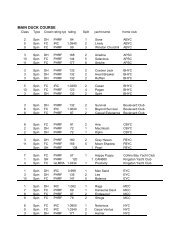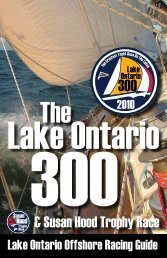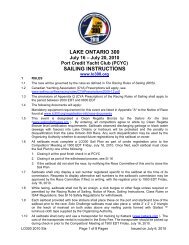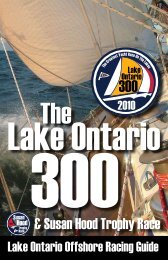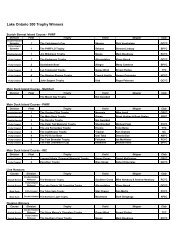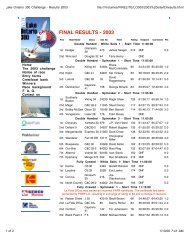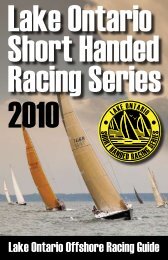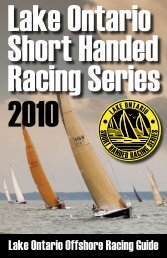Create successful ePaper yourself
Turn your PDF publications into a flip-book with our unique Google optimized e-Paper software.
Page 40 <strong>Lake</strong> <strong>Ontario</strong> <strong>Offshore</strong> Racing Guide <strong>Lake</strong> <strong>Ontario</strong> <strong>Offshore</strong> Racing Guide Page 41<br />
Yacht Racing is a<br />
Corinthian Sport<br />
Long distance yacht racing is one of the few competitive sports where<br />
much of each event takes place well out of sight of any form of official<br />
oversight and out of sight of other competitors. It is for this reason that<br />
it is called a “Corinthian Sport”; one that relies on each competitor’s Corinthian<br />
spirit in order to keep the racing fair and equitable.<br />
This is an interesting topic not often discussed, but an article published in the October/November<br />
2010 issue of GAM has resulted in bringing the subject to life.<br />
The instigation for this article is from a new racer competing in the LO<strong>300</strong> for<br />
the first time admitted to running their engine when under difficult circumstances.<br />
While The Racing Rules of Sailing (RRS) apply to the LO<strong>300</strong> Challenge<br />
Race, there are a number of important considerations that must be taken into<br />
account with such a blanket statement.<br />
Firstly, sailing is a self-policing sport and the Organizing Authority and Race<br />
Committee are there to facilitate the racing, not to act as referees. However,<br />
the Race Committee may protest situations that no competitor could have seen<br />
using the protest process.<br />
The basic principles of the sport of sailing as stated in the Racing Rules of<br />
Sailing are:<br />
Sportsmanship and the Rules:<br />
Competitors in the sport of sailing are governed by a body of rules that<br />
they are expected to follow and enforce. A fundamental principle of<br />
sportsmanship is that when competitors break a rule they will promptly<br />
take a penalty, which may be to retire.<br />
Following on from this principle that the rules are always in affect and RRS 4:<br />
Decision to Race:<br />
The responsibility for a boat’s decision to participate in a race or to<br />
continue racing is hers alone<br />
Thus if conditions or circumstances are such that a sailboat believes that she<br />
should not continue to race or that have caused her to break a rule, then she<br />
should retire or take a penalty whichever is appropriate.<br />
The <strong>Lake</strong> <strong>300</strong> Challenge Race is new to many participants each year; either<br />
with sailboats with little racing or with only around the buoys experience. This<br />
means that many of the participants may not be as familiar with the Racing<br />
Rules of Sailing that come into play more often in long distance racing, i.e., to<br />
know what’s permissible or not under the rules in the areas of propulsion, making<br />
fast, leaving the vessel, anchoring, outside help, etc.<br />
Moreover, some of the Racing Rules are amended in the Notice of Race (NOR)<br />
and Sailing Instructions (SI’s) of the LO<strong>300</strong> or other such races to better reflect<br />
the conditions of these races. It’s important for racers to remember that the<br />
NOR, SI’s and other referenced documents in them rank as rules so the Basic<br />
Principle applies to the contents of these documents.<br />
The LO<strong>300</strong> Committee is continuously reviewing the NOR and SI’s to either<br />
change them to better reflect what is needed or improve the wording for clarity,<br />
and it is up to each competitor to make sure they know the rules and have<br />
reviewed the events SI’s and NOR.<br />
If racers realize, after they have finished, that they broke a rule, they can inform<br />
the Race Committee that they wish to Retire After Finishing and receive the<br />
score RAF. Many racers consider this score a badge of honour showing that<br />
they uphold the Basic Principle of the sport of sailing.<br />
ISAF documents are available for free on its web site, www.sailing.org. This includes<br />
The Racing Rules of Sailing themselves and other information that racers<br />
can use as reference sources.<br />
Graham Dougall<br />
Race Officer<br />
LO<strong>300</strong> Challenge Race &<br />
LO<strong>300</strong> Committee<br />
Specializing in<br />
Performance Sailing<br />
Yachts, and offering a<br />
large brokerage selection.<br />
RCR Yachts Inc.<br />
223 Lockport Street<br />
Youngstown, NY 14174<br />
716-745-3862<br />
www.rcryachts.com



